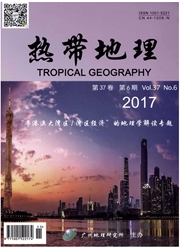

 中文摘要:
中文摘要:
本文综合运用GIS和RS技术,针对大埔县山地城镇的特点,选取地形地貌因子、生态敏感性因子、限制性保护因子和交通、城镇区位因子参与土地适宜性评价,利用层次分析法(AHP)获取各评价指标的权重值,然后运用多因子权重叠加分析模型对其城镇拓展空间土地适宜性进行评价,并根据适宜性大小划分出优化建设区、适宜建设区、限制建设区和禁止建设区4个等级。其中优化建设区面积235.75km2,占总面积的9.51%;适宜建设区352.17km2,占比14.21%;限制建设区1643.92km2,占比66.33%,禁止建设区218.54km2,占比8.81%,另外还有水域27.99km2,占比1.12%。
 英文摘要:
英文摘要:
Land Use Suitability Evaluation is the basis of land-use planning.Due to the particularity of the mountain towns,in this paper the topography factor,ecological sensitivity factor,limiting factor,transportation and urban location factors are selected to make land suitability evaluation for mountain towns' spatial development.Huliao Town,the county seat of Dabu County,is taken as an example to be studied.Analytic Hierarchy Process(AHP) is used to calculate the weight value for each factor,and the multi factor overlay method is used to calculate the land suitability for town development of each grid.According to the evaluation result,the land of the mountain town is classified into four types:the built-up areas(235.75km2) to be optimized,the areas suitable for construction(352.17km2),the areas limited to construction(1 643.92km2),and the areas banned for construction(218.54km2).The result suggests that the GIS technology could make land suitability evaluation quickly and objectively,which could provide scientific decision support for land-use planning.
 同期刊论文项目
同期刊论文项目
 同项目期刊论文
同项目期刊论文
 Simulation of spatial population dynamics based on labor economics and multi-agent systems: a case s
Simulation of spatial population dynamics based on labor economics and multi-agent systems: a case s A Normalized Urban Areas Composite Index (NUACI) Based on Combination of DMSP-OLS and MODIS for Mapp
A Normalized Urban Areas Composite Index (NUACI) Based on Combination of DMSP-OLS and MODIS for Mapp Evaluation of NPP-VIIRS Nighttime Light Data for Mapping Global Fossil Fuel Combustion CO2 Emissions
Evaluation of NPP-VIIRS Nighttime Light Data for Mapping Global Fossil Fuel Combustion CO2 Emissions Analyzing land-cover change and corresponding impacts on carbon budget in a fast developing sub-trop
Analyzing land-cover change and corresponding impacts on carbon budget in a fast developing sub-trop Simulating Urban Form and Energy Consumption in the Pearl River Delta Under Different Development St
Simulating Urban Form and Energy Consumption in the Pearl River Delta Under Different Development St Modeling urban land-use dynamics in a fast developing city using the modified logistic cellular auto
Modeling urban land-use dynamics in a fast developing city using the modified logistic cellular auto 期刊信息
期刊信息
